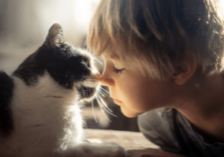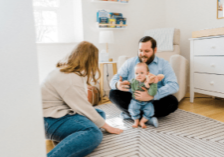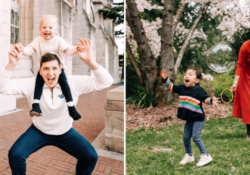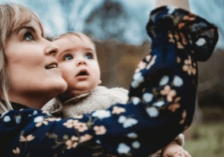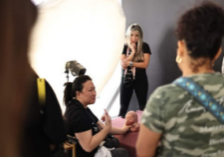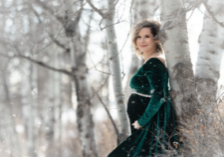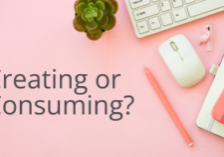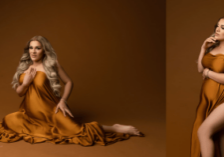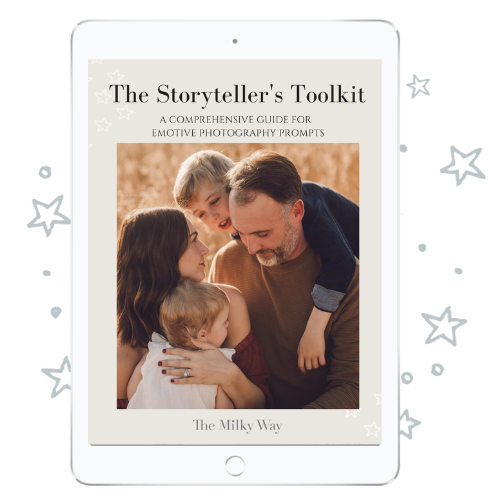Recalibrate Your Money Mindset: Empowering Insights from Photography Business Coach Dan Moyer
Creative people aren’t good at numbers. At least, that’s what we tell ourselves, and often it can lead to big financial problems in our businesses. Unfortunately, you can’t put your head in the sand and ignore your money mindset and expect to have a successful business.
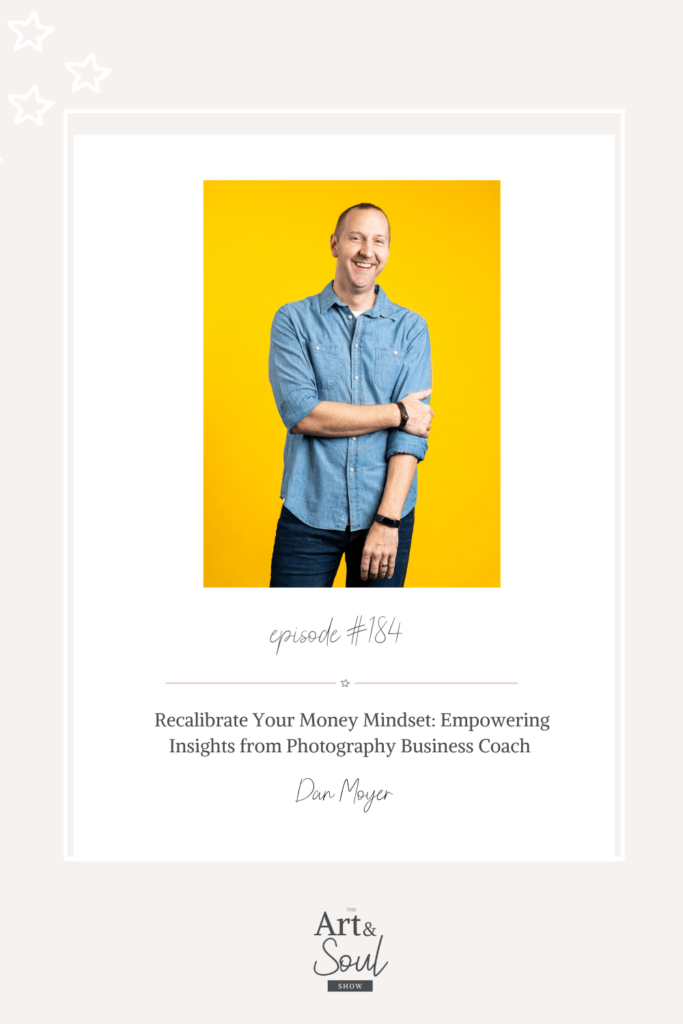
In today’s episode, I’m interviewing Daniel Moyer, a photographer, podcaster, and photography business educator, who shares the money mindset pitfalls that many of us experience, how to shift into a healthy money mindset, and how to change your relationship with money. He reminds us that we actually do have to track where our money is going to have a successful business.
In addition, Daniel is an empath and we have an interesting conversation about how to embrace it and use it to your advantage in life and in business. Sensitive souls, this one’s for you.
What’s in this episode:
- [02:15] How to embrace being an empath, turn it into a superpower, and cultivate empathy in our children
- [10:35] The common money mindset pitfalls that David encounters with photographers and how to shift those mindsets
- [21:06] How photographers can change their relationship with money and plan for success in their businesses
- [33:58] We talk a little shop about our favorite cameras and lenses
- [40:49] The best piece of business advice David has ever received
Tune in to this episode for tips on how to shift your money mindset and plan for financial success in your photography business.
SUBSCRIBE: Apple Podcasts | Spotify
Want to put an end to awkward moments in your photo sessions and create genuine connection? Download The Storyteller’s Toolkit today, featuring 200+ emotive photography prompts, so you’re never left wondering what to say.
Resources Mentioned
Bokeh Podcast, hosted by Nathan Holritz
Book: The Simple Path to Wealth by J.L. Collins
Meet Daniel
Daniel Moyer is a photographer, podcaster, photography business educator, empath, and blind optimist in the best sense of the word. He’s on a journey to guide photographers to find the missing ingredients to building a meaningful, joy-filled, and profitable photography business.
Connect with Daniel
Visit the Daniel Moyer Photography Website
Follow Daniel Moyer Photography on Instagram
Visit the Focused Photographers Website
Follow Focused Photographers on Instagram
Download the free Finance Focused guide
Did this episode inspire you to shift your money mindset and plan for financial success in your photography business? Check out this episode Serve and Deserve: How Your Money Personality Could Be Impacting Your Photography Business with Denise Duffield-Thomas that offers you even more insight on finding alignment in your business!
Transcript
[00:00:00] Daniel Moyer If you boil everything I say down to this one thing. It’s this quote by J.L. Collins. And the book is A Simple Path to Wealth. It’s spend less than you earn. Invest the rest, avoid debt. That’s it. It’s like if you can just do that in your photography business, if you can do that in your personal life, you will be really far ahead of 90% of the other people.
[00:00:22] Lisa DiGeso Welcome to the Art and Soul Show, where we dive into heart opening chats on photography, business life, and that messy in-between. I’m your host, Lisa DiGeso, a mom, a photographer and entrepreneur, and I’ll be sharing honest conversations and advice for photographers with insight on mindset, entrepreneurship and creativity. The goal of this podcast is for you to be able to gain insights and strategies that will get you real results. Because let’s face it, having a photography business can be lonely, but it doesn’t have to be. This is the place you can go when you need a boost of encouragement, a kick in the pants and inspiration to pick up your camera. This is the art and soul show. Hello, my beautiful friends. Welcome back to the show today. I’m super excited to dive into today’s conversation with Daniel Moyer. Daniel is a photographer, podcaster, photography, business educator, empath and blind optimist in the best sense of the word. He’s on a journey to guide photographers to find the missing ingredients to building a meaningful, joy filled and profitable photography business. He’s also the host of the Focused Photographers podcast, and I was introduced to him by my dear friend Colie James, and I am so excited to dive into our conversation today. So welcome, Daniel.
[00:01:39] Daniel Moyer Thank you for having me. I’m glad that Colie set us up to make this happen. It’s going to be a good one.
[00:01:43] Lisa DiGeso Totally. So beyond your bio, tell us who you are and what you’re passionate about.
[00:01:47] Daniel Moyer I am a father of three. I have three year old twins and a six year old, not fraternal twins. My wife and I have been married for almost ten years. Nine years, actually. And like the end of this month, I’m photographer for over 13 years and only recently discovered sort of the passion that I’m really excited about guiding people into their next phase of their life, whether that’s a really exciting business expansion or just becoming the best version of themselves. So that’s me.
[00:02:13] Lisa DiGeso I love that, I love that. So I read and I love this and I read that. I read that you’re an empath because I think that there are like, I’m a sensitive empathic soul.
[00:02:22] Daniel Moyer Yes.
[00:02:23] Lisa DiGeso And I think that we’re labeled as oversensitive. I know that I was. So can you maybe share how you’ve tapped into that, embraced it, and you’ve made it into a superpower?
[00:02:33] Daniel Moyer This is a really sweet question and one that I have never been asked before. So, like, I don’t know, it’s sweet. I think a lot of people see empathy or like oversensitivity or anybody who is like over feeling as weakness. Right. And I used to think that same thing, too, where it was like my kindness at a wedding day or my agreeability or my thoughtfulness was weakness and that I’m easy to like walk over, which is not the case. I just want people to, like, be the best version themselves. And I remember when this shifted for me, I was at a workshop. It was Steve Spirito workshop where we had to do this exercise, where we had to talk with another person that was at the event and we had to just use these active listening skills and we weren’t allowed to like hang out on version 1.0 of conversation. We’d really try to dive down. And now I was already an emotional wreck because my first daughter had just been born. I was away from her for like, you know, three or four days. And it was just like I was and I felt like I was neglecting them. And there’s all this stuff. And I remember, like, squeaky voice crying out loud in the middle of the workshop and like, I’d like just so it’s not a great situation for me to be in. And I’m like, I am so embarrassed. I can’t keep it together. And I’m going into this exercise thinking all this. And as we start going through it, this is like the second round. And I’m realizing like, this is very natural for me, like talking with this other person who I actually know nothing about. But he was really opening up to me and I had no understanding of what he was going through, but I really felt like I was able to help him sort of work through it and I was able to come alongside of him on that journey just by asking questions. I was like, Wow, this feels really good. And afterwards, like, we sort of adjourned and then we got back into the big group and everyone’s talking about how it went in, in front of sort of everybody at the workshop. He was like, I just want to take a moment and thank Dan for like his thoughtful questions because he was so, so thoughtful and so careful with his questions about this like, really sensitive thing. It was at that moment that I knew that, like my empathy and my ability to step into people’s shoes was a superpower and not something to hide behind. And I said, That’s through a squeaky voice anyway, too. So but like, you know, I’m still working through it, but I tend to over emotionalize things a lot still, but I’m much more confident in that ability to step into people’s shoes and be emotional with them.
[00:04:41] Lisa DiGeso I love that because I honestly, I used to spend so much time in the girls washroom crying like it’s like through, like my whole high school. I would just be in there in tears because I just had so many big feelings about everything.
[00:04:55] Daniel Moyer About everything. Yeah.
[00:04:56] Lisa DiGeso Yes. And even like, even I remember, like, being a first time mom and just a commercial came on and I just was gushing, like, just sobbing. Yeah. And my husband’s like, What is with you? I’m like, number one, I’m like, I just had a baby. But number two, like, I just have a lot of feelings. Like, I can’t help it. Like, I’m someone who has a lot of feelings to begin with, so just go with it, man. Like, enjoy the ride.
[00:05:19] Daniel Moyer Yeah. My wife and I, the same thing. We were like, we bawl all the time, like Ted Lasso and all that kind of stuff. It’s just yeah, all the little kind of stuff sets us off, especially about kids or relationships or our parents or like wanting to be better versions of ourselves or whatever it is. Yep. I’m right there with you.
[00:05:33] Lisa DiGeso Well, I think it’s just so fascinating that societally, how being a sensitive or an emotional person has always been such a shameful thing or something to look down on people about. When truly, especially as photographers, being able to step into our clients’ shoes or just feel what they’re feeling or you can even see in a person’s eyes when the session changes and you can tell that they’ve lost that confidence and that feeling, you know intuitively because you are empathetic how to adjust and how to position yourself to make things more comfortable for them. So I just think, let’s dive into that, let’s tap into that and make that something we talk more about and we teach our children that being sensitive is such a gift.
[00:06:19] Daniel Moyer Yeah. One thing you just said brought up this podcast episode that I was recording with a few friends where it’s like in the beginning when you’re a photographer, you like, go through these posing flows and you want to like, get the awesome picture and and get like the big award winning thing or whatever it is. But it’s like the longer I’ve been in business, the more I realized, like the night shot that I have to get at a wedding, a lot of couples don’t care about it. And it’s like, that’s like they just I need to be in touch with what they’re needing and what they’re feeling. You can see something flash across somebody’s face or you’re photographing or you can see when they’re checked out and they’re done. They’re done with pictures and they want to get back to the reception and whatever it is. But like, yeah, it’s like those things is like, wow, like I can pick up on these things. I can tell when somebody is done and it’s like, Yeah, let me just go with that. And people comment on that afterwards. They’re like, Yeah, you were just seemed like you knew exactly what we wanted and what we needed and let us do it.
[00:07:09] Lisa DiGeso Yeah.
[00:07:10] Daniel Moyer Yep. I feel that.
[00:07:11] Lisa DiGeso It’s like learning how to be an empathetic listener, I guess. Yeah, maybe like with body language, I do a lot with newborns. I”m a newborn photographer and I specialized with maternity and newborn, so. And it’s funny because I know what my babies want. I know, like, I can tell when they start, when they start to move in a certain way, I’m like, like we don’t need to get her at, like, super upset and in tears because she’s hungry. And I can tell she’s hungry cause she’s giving me cues. Let’s just, like, take care of that before she gets upset. Yeah. Oh, and parents are like, Well, how did you know that? I’m like, I don’t know. I’m just I felt it. I felt that.
[00:07:44] Daniel Moyer Yeah, it’s such a feeling thing. But people, I mean, some people don’t have it and it’s like, okay, this actually is like a superpower. Like, I think if I don’t know, there’s an emotional IQ test, but if, if there is and I know there’s a lot of research coming out about emotional IQ, I know I’ll be high on it because I feel like I can just pick out things or pick up little things that people are feeling or when they send like those little signs, right? I 100% believe that’s a superpower.
[00:08:08] Lisa DiGeso Yeah, absolutely. And like, as humans, like, we’re always like, we’re energetic base and we’re like emitting these frequencies of like, you can feel it. You can feel like you probably feel it on the other end, like I’m lit up today. I’ve had you’re my fourth podcast today and I get to do all this is my favorite thing to do.
[00:08:23] Daniel Moyer Four! Yeah, that’s amazing. Good for you. Holy moly.
[00:08:26] Lisa DiGeso I love it. I love it.
[00:08:28] Daniel Moyer Hashtag batch content.
[00:08:30] Lisa DiGeso Hashtag start working.
[00:08:33] Daniel Moyer Crushed it.
[00:08:35] Lisa DiGeso But it’s true. It’s like tapping into your superpower as an emotional genius, I think. And even, like, just teaching kids. So how are you teaching? Are you working with your kids? I’m like, Do you find that they’re empathetic and how do you cultivate that in them?
[00:08:48] Daniel Moyer That’s a big question. Each of my kids is so massively different, right? Regina is girl twin, Henry’s boy twin. And then Alice is the oldest who’s six, and Alice is just like free flowing, free flowing, spirited, like very just, you know, go with the wind. She can get really into something or not. She is the feeler right? So when something happens with one of the twins or something, she comes running right over and wants to pick them up and love them. And so she’s the deep empath already. Regina, we’re working on to be a little more empathetic because right now she’s going to be a boss CEO who takes no crap from anybody. So it’s like, it’s like, I don’t want to squander that totally and, and, you know, go off of that or anything. But I also want to be like, Hey, there’s other feelings out here other than your own. You have to think about those. And then Henry’s just like, he’s like me. He’s a deep feeler. He’s really highly emotional as it is and very aware of what other people are doing and wants to be part of the group. So, like, we’re already there with all of them, except Regina needs a little bit of a little bit of molding, maybe.
[00:09:53] Lisa DiGeso Love that Regina.
[00:09:55] Daniel Moyer Will have guiding.
[00:09:56] Lisa DiGeso Yeah, she’s going to nail it, though.
[00:10:00] Daniel Moyer But, like, they’re all so different. It’s like, I can’t wait to see what this one does and what that way it’s going to be good.
[00:10:04] Lisa DiGeso My son’s 13, and he’s our one and only and our little miracle. And it’s really interesting just watching yourself and some of the times like your best characteristics and also sometimes your worst ones through your childhood.
[00:10:19] Daniel Moyer Yeah, I’m like, Oh man, I’ve downloaded this kind of stuff onto my kids pristine little hard drives. Like why did that have to come out or something like that?
[00:10:26] Lisa DiGeso But yeah, it’s programing. They’ll figure out in their forties.
[00:10:31] Daniel Moyer Oh, great. Mom!
[00:10:35] Lisa DiGeso I know, right? It’s your fault, Mom. So we’re going to talk a little bit about mindset today. And I would like to talk about maybe some of the common, specifically money mindset. So what are some common money mindset pitfalls that you encounter with photographers?
[00:10:51] Daniel Moyer Hmm. It’s a big question because it’s all like everybody’s got a little something different. Like, but when I reached out to my community a while ago, I asked one simple question. I was like, Hey, if you were to describe your relationship with money in one word, what would it be? And the responses I got were overwhelmingly negative. It was things like strained, confusing, avoiding, unimportant, tiresome, all things like that. And to be fair, there were a couple that were like, you know, it’s freedom or provides freedom, things like that. And I was wondering, like, where did this all come from? And if you if you ever heard of this thing called the Klontz money script inventory, that sound familiar at all? Okay. So there there’s a guy who’s a financial psychologist name was Brad Klontz, and he came up with this these like four scripts that we tell ourselves. And I’m not going to go through them all because it’s be too much time for the podcast, but they’re basically four of them. Money avoidance, money status, money worship, and then money vigilant. The money avoidance cycle seems to be what I see in a lot of photographers. And that’s like this idea that a lot of photographers will tell themselves that they’re not a a money are a numbers person. They’re creative and they they they don’t even try like they’re not even interested. Like, I can’t understand it. I’m a not a numbers person. I’m a creative like I can’t do anything with that. And so that’s like the first part. And then avoiding looking at your numbers only increases your likelihood to overspend because you’re trying to avoid it. Make yourself feel better by not looking at it and you’re just wanting to live free and whatever. And then you say like, Oh crap, my finances are not actually that great. And it’s just this endless cycle of like going around and around this circle of avoiding and then trying to see the truth and then being realizing that you suck at numbers. You’re like, I don’t know what to do, but see, that one a lot with photographers were like, I’m not a numbers person. The two other ones that I would say maybe, and I can just quickly go over them is that a lot of photographers have an over fixation on money as the solution to like they’re like that’s going to be the solution to all their problems. And I think part of it is, in fact, like our industry loves this marketing term where we say six figures like I want to be the six figure, and they look like I’m totally fine with like, you know, you need to hit money numbers, you need to hit goals, you need to be profitable, all that stuff. But it seems like that is like the goal that you see over and over again, right? Like if I hit six figures, I’m going to make it. I’m going to all my problems are going to be solved. And then the last one, which I think is maybe the most tricky one, because it involves so many layers, is defining what enough is for them as an individual. Right? Or in other words, like what do they actually need to make or how much money they actually need to make in order to live the life that they want and confidently be able to turn away, work and set appropriate boundaries and all that kind of stuff. So yeah, there’s a lot.
[00:13:34] Lisa DiGeso Interesting, there’s a lot there. I love that. I think a lot of the times you don’t even realize that you are doing that. Like speaking from experience, like there is years I didn’t even pay myself because I didn’t even know I was supposed to. I was just like taking that money and just throwing it back into my business buying props and like, thinking, Oh yeah, but I’m profitable. Like baby girl, that’s not profit.
[00:13:56] Daniel Moyer Right? You deserve to have some money too.
[00:13:59] Lisa DiGeso I would like some money, too please. Oh, dear. So what shifts do you think with mindset would help to get over the avoidance and overspending that we as many photographers do?
[00:14:11] Daniel Moyer So there’s like, I think it’s first, it’s like intimidation, right? Because that what I said before about how many photographers like they’re just like say they’re not a numbers person. Yeah I think just getting like your hands dirty and just getting over that that initial concern about like just being intimidated by numbers and you’re going to make a mistake or whatever it is, because I think so many photographers define their relationship as they’re not a numbers person, so why bother? And numbers are intimidating. But I think the shift is, is that money’s just a tool. And that is what like that is what we all need to realize is that money is just a tool for for getting where you want to go in life. And it deserves no more power or no less power than it then it just deserves to get you to this point. Right. And where we want to go. I think if we go back to that Klontz money script inventory thing is going to look different for everybody. But I think it’s a set of values or a set of principles that you can say, okay, this is where I want to get right, and this is that money vigilant, one of those Klontz money script inventories. The three of them are usually like sort of negative ones. In this last one, the money vigilant one is really important and it’s considered the healthiest one. But like these people that adopt this money vigilance mindset tend to believe that money is helpful to get them to where they want to go in life. They recognize it as a powerful part in making life easier. But it’s also money in itself doesn’t bring happiness. This goes back to that tool thing that like it’s not like you’re trying to get to this specific number, then everything’s going to be okay, right? Because when you get there, the problem with like, we’re all wired for desire, all wired to like, get to this thing of like, I want more, I want this. I want the bigger house, the bigger car or whatever. And that’s why just talking about like, what is enough for you. Defining that so that way, when you get to this point of, okay, I’ve gotten here, I’m good, I’m all set, that’s when you can say like, okay, I am content with where I’m at. And I think the last part is just like focusing on saving for the sake of saving, focusing on frugality, like that’s the place that we want to go. So if that’s where we want to get, you have to focus on the habits that lead you to that place.
[00:16:10] Lisa DiGeso Right. And so if you’re overspending, if you get like a client and you’re spending $600 and you’re only charging 500, there’s a problem there.
[00:16:17] Daniel Moyer Right. Yeah, right. Yeah. Having like a six figure business says nothing. If your expenses are $90,000 right now, you have a $10,000 business.
[00:16:25] Lisa DiGeso Yeah, no, that was funny, because I did. It was a few years ago. I used to do holiday mini sessions and I loved them. Like I loved them, but the problem is I have a, I am a reformed people pleaser and I’m getting better at saying no.
[00:16:37] Daniel Moyer And yeah.
[00:16:39] Lisa DiGeso 87 holiday mini session in a month period and drove myself into the ground. And because I’m not just like a mini session kind of person, I’m an over deliverer, like my mini sessions for like 40 images. Like, that’s not mini anything. Right? And very like all the sets and the costumes and everything. So it came to I think it was actually, oddly enough, Christmas morning. Eve morning. So it was the day before Christmas and I was finally crunching my numbers for what I did, what I spent for the holiday mini sessions of 87. I made $4,000 for all that work and I just sat and I sob cried. And I was like, Why did I do that? Why don’t I do that to myself? Why did I say yes? I missed so much? I missed my son’s school play. I missed I missed so much by trying to make everybody happy and I made myself miserable. And I thought I was doing it for the money, but I wasn’t.
[00:17:33] Daniel Moyer Do you think that you had to go through that to like shock value, learn to not do it?
[00:17:40] Lisa DiGeso I think that I had to do that repeatedly.
[00:17:42] Daniel Moyer Got it.
[00:17:46] Lisa DiGeso Then I finally got it. Yeah. That it was that specifically because I’d been doing it for eight years and it was just progressively getting worse and worse and worse. Oh man. And I kept like, avoiding, avoiding, avoiding it, pretending it wasn’t happening. and then, then I finally was like, okay, let’s just actually see, like, I feel like I was really profitable this year and like, Nope, nope. Girl, you were not. Nope.
[00:18:05] Daniel Moyer That’s so brutal. Like, like when you find out, like, I remember when I kind of came to my financial awakening was I was driving to a session and it was outside of Philly and I was driving across this bridge. And earlier in the day, I’d had this phone call toward the end of the year, had a phone call with my accountant. He was like, Hey, this is what taxes are going to be like. And he’s like, You’ve had a great year. You’re going to have so much money. All that kind of stuff. I’m like, Wow, this is great and drive across the bridge. I should be ecstatic. But I’m angry because I’m like this dude is saying, like, I’m supposed to have this really amazing year, but where’s that money at? Because it’s surely not in my bank account.
[00:18:39] Lisa DiGeso What did I do with it?
[00:18:41] Daniel Moyer And it was just like, and it’s not even like it was in my personal bank account. I was just spending money on like, stupid stuff, like going out to drinks and dinner with my wedding clients and spending it on like stupid upgrades or whatever. And I think it’s just like, I don’t know, sometimes you need that like awakening that thing to shake you and say, No, no, like you could be doing this better.
[00:19:00] Lisa DiGeso Yeah, it’s so true. It’s so true. And I think, I mean, that’s like it’s funny because a lot of times you think of things like that as failure and it’s not because it’s really just lessons or it’s like business rock bottom.
[00:19:13] Daniel Moyer Business rock bottom. Yeah.
[00:19:14] Lisa DiGeso And you just like you kind of have to hit there at like injury out and through and up and get into financial recovery. I guess so, yeah.
[00:19:22] Daniel Moyer How long have you been a photographer for?
[00:19:24] Lisa DiGeso Since 2010.
[00:19:26] Daniel Moyer Okay, same here. Okay, so we’re in, like, the same boat where I think when you and I started, there wasn’t that many podcasts about photography. There wasn’t. I remember being on the Digital Wedding Forum, the DWF. Yeah, just like that’s where everybody went to ask questions was like, how great is that now that we’re having a conversation about this that any newcomer in year one through three can come on and talk about or like hear about the stuff that we did the hard way. It’s like, Oh, okay. Like I need to make sure I know my numbers. I need to dive into these things and make sure that I’m doing this before the session and figuring out that I’m not going to make $4,000 after you shoot 87 sessions or whatever it is, you know?
[00:20:06] Lisa DiGeso Right. And like, I wish there were something like this out there. But what I would listen to anyway? Probably not.
[00:20:16] Daniel Moyer There was no, I mean, I was on MySpace and like that was it.
[00:20:20] Lisa DiGeso I was on Flickr and ilovephotography.com was the one I was on and it was so funny because back in the day it was like if you were a mom and you had a camera, you were a mom with a camera and that was like super shameful.
[00:20:33] Daniel Moyer Like what?
[00:20:35] Lisa DiGeso No. Yeah, it was like, so bad to be a mom with the camera. Yeah, so. But yeah, no. Know, it’s like now it’s like, Yeah, I’m a mom who’s a photographer. Cool.
[00:20:41] Daniel Moyer Yeah, there’s like, a whole like that. Oh, yeah. Mom photographers, right, isn’t there? Like a mom talk Facebook group? There’s, like, a billion photographers in it. It’s awesome.
[00:20:50] Lisa DiGeso Yeah, it’s crazy. And it was so funny, like the industry back then and how it’s really like, it’s changed so much. It’s just, it’s just changed. And I think I love it because there is more availability for conversations like this that I wish that we would have listened to or had.
[00:21:05] Daniel Moyer Yeah, heck yeah.
[00:21:06] Lisa DiGeso So in what other ways can photographers plan for success in the photography businesses and start to change the relationship with money?
[00:21:15] Daniel Moyer All right, let’s get into some like rubber hits the road kind of stuff. Yeah, this is good. So like so I think there’s two ways where it’s like, okay, this is how we start to change the relationship with with money. And a lot of it is like, okay, what’s the saying? Mold grows in the dark, flowers bloom in the sun, right? Part of it is just getting your hands dirty. So there’s I think whenever I coach photographers on this or coach clients on this and it’s like a two step process and they both are equally important. The first part is defining your values. It’s like, why are we going to talk about defining values? We’re talking about money. It’s because you need like a North Star to like, say, like, this is what I must spend money on. This is important. This is where I’m trying to go. This is the dream. Like all that stuff, right? And it’s it’s simple. It’s just asking yourself, what do you value? Do you value free time? Do you value weekends? Do you value time with your kids? do you value hard work, your fitness, your health? Do you value being debt free? Right. Like those are the questions you have to ask yourself. And you take that. You write a big list, an exhaustive list of all the things that you truly value and you know that you value them. Do you know Nathan Holritz? He hosts the Bokeh Podcast? Okay. I talk with him about this and he said, like, he’s like, you know, your values when you when you bump into them. And it creates like this, this experience inside of you, right? Like, you know, when it’s like, oh, like you had this really great conversation with a friend and it’s like, wow, I really value that friendship. Or it’s like, Ooh, I talked smack on somebody. And that made me not feel good or like, Ooh, I wanted to go on this vacation this year, but I actually spent too much, like ordering food in every single week or something like that, right? Like, No, no, no. This is where I’m trying to go. I want to have a month off with my family every year. It’s like that’s what I value. Well, if that’s the thing you value most, then all of the ordering pizza an extra couple times a week. Maybe that’s something that’s easy for you to cut, right? Or maybe dinners around the table or something that you absolutely love. And it’s like, No, no, no. I desperately want to actually be able to eat dinner with my family. I love whatever it is, right? Knowing those values and getting crystal clear on what those values are and where you want to go is step number one. Feel me?
[00:23:24] Lisa DiGeso Yeah. Yeah, absolutely.
[00:23:27] Daniel Moyer The next part is like is I call it getting the big picture. Follow me on this because there’s lots of apps that do this and all that kind of stuff. But I’m a take a step back and say that we need to get pen and paper out and just put a pen and paper down on our desk and open up our bank account. The things we need to do analog about this are let me put it this way, apps that do budgeting for you and stuff are really great, but there’s this huge learning curve and it’s really easy to get frustrated with them and fall off because you don’t know how to use it or it’s frustrating or whatever it is. You have to take time to set it up, whatever it is. This analog process is opening up your bank statement and taking a piece of paper and a pencil and writing a couple of headings on the top of the paper and then categorizing every one of your transactions for one month. So here’s what we’re going to do. Get a pen and paper out. How many times can I say pen and paper in this conversation? Goodness gracious. You write out these headings at the top of your paper: housing, which is basically rent and mortgage utilities, which is phone, cable, water, Internet, that kind of thing. Child care as part of that, groceries, not food, groceries. This is getting food from the grocery store. Eating out is going to be in the splurge category, which is coming up after debts. Debts is going to be your student loans, car payments, credit cards, that kind of stuff. The fifth one is splurge. And that’s where all the non-essential items go into. Last one. In our house, we have an Amazon account because or like an Amazon list because we just there’s so much stuff just gets thrown in there. Like it could be business stuff, it could be kids swimsuits, it could be a tofu press that I just purchased. Right? Like, it’s just a million things, but this is what you do and you open up your bank account. You categorize all of your transactions from one month time into those categories. That’s it. You can you do this for three random months. I like doing March because it’s boring and winter brown over here and like nothing much happens. I also do July because usually we’re going on vacation in July, we’re spending maybe a little more money. And then maybe also do November, because Christmas comes up when you really buy a lot of gifts and stuff in November. So what like a wide variety picture of like how much are we spending? And again, this is like half hour activity. If you drink, get a glass of wine, sit down and just like, write out all these things and you’re getting this big picture. That’s the goal. What do you do with this information? My personal belief is that it is way easier to spend less than it is to make more. It doesn’t mean that you stop trying to make more, but you have to look at these things and say, Wow, I didn’t realize that I was eating out this much or going to Starbucks this much or paying for flight upgrades or whatever it is. And there’s areas that you’re looking at and you’re saying, I really don’t need to spend this money. And that’s where it goes back to having the values. It’s like, okay, I want to have that month long vacation with my my family. I need to cut in these areas so I can get to that point. What I do in my life is from this information, I create a real budget where you say, okay, I’m adding up all my expenses, all this stuff, every transaction came out of my bank account, and I want those total monthly expenses to be 75% or less of the amount of money I brought into that account. So 75% or less is the money that went out of the total amount that came in. Am I explaining that right? You following me?
[00:26:38] Lisa DiGeso Because then you retain 25%. Yeah.
[00:26:40] Daniel Moyer So you want to get to this 25% savings rate or more. Right. Like that’s just a starting point I think for a lot of people. But some people have said 25% and they’re like, what? I haven’t gotten 3% saved. But yeah, just go through and just get this big picture. Just write it out. It’ll take 30 minutes, an hour, and you just all of a sudden have this picture of the financial health of your personal life. And you can do this with your business as well and keep going. And then you just have these two pictures of like what things look like and you can really start and get the tip of the iceberg from there.
[00:27:10] Lisa DiGeso Absolutely. Because looking at that data, you can’t really be that emotional about it because you’re like, these are the decisions I made, right? I did that so I can make different choices next time if that’s going to lead me to my goal or make these decisions that are going to lead me away.
[00:27:26] Daniel Moyer Yeah.
[00:27:27] Lisa DiGeso Love that.
[00:27:28] Daniel Moyer Yeah. And I think I think it’s just the values thing, right? Like when I was going across the bridge and my accountant had called me earlier in the day, I remember feeling, like I said, really upset about this whole thing. But I looked down and I had this, you know, Starbucks and I’m not going to hammer on Starbucks. I’m not going to be between somebody and their Starbucks. Right. But like, I was spending an inordinate amount of money on Starbucks and cafes and all that stuff. When I had a mountain of debt, over $100,000 worth of debt sitting over here that I was ignoring, and I’m somebody who would say I value my family, I value my financial freedom, I value all the stuff. And it took like this jolt of me saying, wow, like, I’m saying that I really value these things, but I’m not actually doing the effort. I’m not doing the actual work to create the budget and live and stick by it so I can be debt free and so I can send my kids to college, which my parents didn’t pay for me, and I want to do that for them and all that stuff, right? Like it’s like you have to do the work in order to get to where you want to go and all that little stuff, all the little things they used to buy, all the little upgrades that whatever pale in comparison to me wanting to send my kids through college or whatever it is, you know?
[00:28:32] Lisa DiGeso Yeah, it’s so true. It’s so true. It’s funny you mention Starbucks because I literally have had one Starbucks coffee in like two years. Yeah, that’s it. And I used to go all the time. And what actually changed was like we did have a breakdown of how much I was spending going to like fast food places or like Starbucks. And then my husband, he was like, How about you can still go, but you’re only going to get $100 gift card and that’s going to last you the whole year.
[00:28:57] Daniel Moyer Oh, cool.
[00:28:58] Lisa DiGeso And I was like, Oh, challenge accepted, sir.
[00:29:00] Daniel Moyer Wow.
[00:29:01] Lisa DiGeso And then yeah, and then I just kind of forgot to go.
[00:29:04] Daniel Moyer Yeah.
[00:29:05] Lisa DiGeso And I probably still have 50 bucks on it.
[00:29:06] Daniel Moyer Like sweet splurge tonight. Interesting. One of the things I did is like, so I would take my daughter to daycare. And on the way home I would literally either drive past a Starbucks or a Dunkin Donuts. And I was like, so tempted every time because, I like the commute working from home. It’s like I need something that breaks up like family time of the day from work time of the day. And getting a coffee was always that. So now I said for me it was I was opening up my credit card and I would put $5 on paying on my credit card every single time. Every time I felt that like urge, I would go buy it. That was my thing. And I would start and just start paying it down. Nice, because the the debt was the thing that was crushing every part of of my being back in the day. It was brutal.
[00:29:52] Lisa DiGeso It really does. And you know, what is interesting and what you never really hear talked about much is the effect debt, and even business financial debt, the effect it has on relationships, on families, on marriages. And we don’t really talk about that. It’s a big thing.
[00:30:08] Daniel Moyer Yeah, there’s a lot of heavy, you know, conversation there with my wife and I when we were really trying to figure out like what our relationship looks like because her parents paid for college, she was a teacher. I went to a liberal arts. And I went for fine arts. Well, it’s not like you buy your books and. And your notebooks and you’re good for the year. I was spending hundreds, if not thousands of dollars a month on photography supplies, on film paint, on different kinds of paints, on canvases and all that kind of stuff. And I came out of college with a ton of debt. Then when I started my business, I was, you know, buying everything on credit because that’s just what I thought was the right thing to do. So I thought the key to financial freedom was was like buying things you can’t afford on credit. And then like, you just look like you’re successful or whatever. Boy, did I have it wrong.
[00:30:53] Lisa DiGeso I know. You know, it’s funny because I’m a newborn maternity photographer, as I’ve mentioned before. Yeah. And our thing is like the props and it kills me. It kills me because I am an educator and I love it. And but what I love to teach is that you really don’t need that many things, right? Like, it’s so addictive to get the newest blanket or the hat or these headbands and they’re and they’re not cheap. But when you see these studios that are just chock full of them, it hurts me in my heart because I’ve also been there and I know how much these cost and how much these new photographers are spending and the ones that see this think that’s the way that it’s supposed to be. Right. And it’s so sad because it’s not it’s not like we’re supposed to be profitable. Like, why on earth are we doing business if we’re not?
[00:31:36] Daniel Moyer Yeah. If you’re not paying yourself, if you’re not like this because it’s so hard like that, because in the world of Pinterest and Instagram and like, that’s the highlight reel. So it’s like, oh, I’m, you know, I’m supposed to like, have this huge variety of, like dresses and stuff for kids and props and all that kind of stuff. But I think photographers a lot of times put themselves last in everything. They put themselves last for paying themselves. They put themselves last for like on their calendar, on their schedule. They put themselves last by giving themselves the leftovers of their time. Do you know what Parkinson’s Law is?
[00:32:07] Lisa DiGeso No, but tell me more.
[00:32:09] Daniel Moyer Parkinson’s Law basically says that work expands to meet the allotted time for the container.
[00:32:16] Lisa DiGeso Yes, yes, yes, yes.
[00:32:18] Daniel Moyer So it’s like it’s the same thing with with your schedule, right. Like you book yourself crazy because you’re like you’re you’re how much money you make is tied to how much you work. Right. And it’s like you just end up getting overwhelmed because you’re not giving yourself the time. First. I think we have to shift that, right? The same thing is said for money where if you don’t pay yourself first, if you don’t, if you don’t give money to where money actually needs to go, if you don’t sustain your lifestyle and your business, then it’s going to get spent elsewhere. And you know, whether it’s on props or whatever it is, like I remember when I before I had a system for organizing money inside of my business, I would just have like a big chunk of money sitting in there. It’s like if if the account not at zero, like I’m set, right? Like I got money to spend. Yeah, but the problem is, is like that money is actually earmarked for paying a second photographer, for paying cost of goods sold, for paying taxes or for paying myself. And I was not pulling money out of that. And that money would just get spent and all sudden it’d be like, oh my goodness, I haven’t moved money over to pay myself first and now I screwed myself because I paid that, because I told my clients I would go out to eat with them and pay for dinner, or I had a wedding outside of the state and I paid for first class upgrade or whatever it is.
[00:33:28] Lisa DiGeso And you and you’re always like, I deserve it. I deserve it. I deserve it.
[00:33:32] Daniel Moyer Right, Exactly. Yeah, it’s so is. But again, this comes back to the values thing. It’s like, what do I really value and where am I trying to get to? Yeah, and that just does not align with where anybody’s trying to go. And it just becomes this thing where you have to be really reflective with seeing what’s out there and like being inspired by other photographers and everything, but also by saying like, I’m good with what I have right here, I’m good with these props, I’m good with this kind of stuff or whatever it is.
[00:33:58] Lisa DiGeso Yeah, completely. I’m because I’ve been eyeballing the Nikon Z9 and I have I got the Nikon z72 or whatever, the mirrorless one. And I was like, we’re not even shooting this year, Dan. I’m not taking clients. Why do I need a new camera?
[00:34:14] Daniel Moyer But it’s fun because you’re still an artist, you’re still creative.
[00:34:19] Lisa DiGeso And I’m just like, That’s not my budget this year. You can save up, Lisa.
[00:34:25] Daniel Moyer Yesterday, I literally switched back from Sony to Nikon.
[00:34:28] Lisa DiGeso Did you really?
[00:34:29] Daniel Moyer Yeah, I was Nikon for since like 2008 to 2020. And then I switched over to Sony and the now I’m switching back and I crunched the numbers before I made the switch and I will make money on the trade by buying the Z six twos and selling my A9s. Yeah so yeah financial decision. Got it.
[00:34:49] Lisa DiGeso Did you sell your lenses too?
[00:34:51] Daniel Moyer Yeah. Selling everything. Going from Sony to Nikon. So like, everything is going.
[00:34:55] Lisa DiGeso Oh my God, I that you would have gone from Nikon to Sony. And so originally you got rid of all your Nikons and now you’re…
[00:35:02] Daniel Moyer All. Everything. Yeah. In 2020, like I was selling everything out. Wow. I finally saw, like, the last couple of pieces, like maybe six months ago, which is kind of funny. So I was like, I had d850 then, and now I’m moving back to, like, the whole mirrorless line from Nikon. So it’s different stuff anyway, but.
[00:35:15] Lisa DiGeso It’s so like, it’s funny because like, I am, I’m having a hard time cause I’m D5, I love my D5. I’ve been D5 for years. Yeah, but I am like, I got the net mirrorless and I’m really trying to love it. And I’m just not loving and I’m trying.
[00:35:29] Daniel Moyer Really. Yeah.
[00:35:30] Lisa DiGeso I know. I’m like, the only one.
[00:35:33] Daniel Moyer Yeah, There’s definitely some people who, like, still love their, I know plenty people who still love their, like, can in five DS and play people who love their like Nikon. I love the the d850. I love the camera but I’m just gonna go mirrorless because.
[00:35:46] Lisa DiGeso Yeah so mirrorless I love it what’s your go to lens.
[00:35:50] Daniel Moyer So I highly documentary approach so it’s like a 35 millimeter keep it at that and a good probably like 75% of the wedding day is on that 35 and then the 85 is on the other body and that’s it. Yeah.
[00:36:01] Lisa DiGeso Have you tried this with the sigma art lenses at all with the Nikon?
[00:36:05] Daniel Moyer Yes. I had. So not with a Nikon. No, actually with the fifties I used to have the Sigma 135 F2 and I had a sigma. 35 14. I think that’s what it was. And both of those were like really lovely. They were beautiful lenses.
[00:36:22] Lisa DiGeso Yeah. That’s one thing that I’ve noticed with Nikon is like the sigma lenses are like chef’s kiss. Like, I love. I love those. I love them.
[00:36:30] Daniel Moyer Yeah, they’re not. It doesn’t seem like they’re sigma’s making anything for, like, the Nikon Z series lenses yet they like. I guess they haven’t released, like, the specs.
[00:36:38] Lisa DiGeso No, they have. Like the. I think it’s the adapter. I got the adapter. And so now, now my lenses work, so.
[00:36:46] Daniel Moyer I have to buy the adapter apparently. Yeah. Or wait until Nikon decides to give their next segment on my Nikon. If you’re listening. Let’s go. Hey, love it.
[00:36:56] Lisa DiGeso So are you ready for our lightning round?
[00:36:58] Daniel Moyer Oh, snap. Yes. Okay. I’m not prepared for this.
[00:37:01] Lisa DiGeso Coffee or tea?
[00:37:02] Daniel Moyer Coffee.
[00:37:03] Lisa DiGeso Most luxurious vacation you’ve ever been on?
[00:37:05] Daniel Moyer All of my vacations over in the past have been with weddings. So my wife used to come along to a lot of the weddings with me. So let’s go. Coolest wedding. I shot a wedding, and my wife came along. It was like 13 people at the base of a broken down castle in Heidelberg, Germany. That’s pretty cool. So cool. It was beautiful.
[00:37:23] Lisa DiGeso Love it, love it. Last thing you did for yourself as an indulgence?
[00:37:27] Daniel Moyer Bought Crumbl with my wife. And we’re going to do it again tonight. Do you know what Crumbl is? Do you guys have that out there? Yeah, it’s like a cookie company. It’s like, yeah, it’s a cookie company franchise. And they just make like they have new cookies every single week. The cookies are like five inches. They’re huge and they’re they’re delectable. So they change every single week and it’s like 25 bucks for like four cookies, which is very expensive. And it hurts my heart to spend it. But my wife and I love to just like it’s like our date night thing. Every two weeks we have like a date night and that’s on our calendar. Nothing breaks that and we just decide what we want to do. So Crumbl date night.
[00:38:01] Lisa DiGeso Love it, love it. You know we don’t have Crumbl. I was thinking it was like, I don’t know, crumble like with berries and oats.
[00:38:09] Daniel Moyer I do love berries.
[00:38:10] Lisa DiGeso I know. Is that Canadian? That’s a Canadian thing maybe.
[00:38:12] Daniel Moyer Berries, eh? Sorry to all my Canadian friends.
[00:38:19] Lisa DiGeso That’s all right. That’s how that’s what we’re all about.
[00:38:21] Daniel Moyer Yeah.
[00:38:24] Lisa DiGeso What’s your favorite movie?
[00:38:25] Daniel Moyer My wife and I. So I’ve lots of favorite movies, but the one that’s my the go to with my wife and I like the one that we always just sit down and watch a million times. This movie called Michael with John Travolta where he’s like an archangel and he comes down, tries to get these people together and he’s like, really is a real irreverent. Yeah, that’s the word you like, smokes and eats too much sugar. It’s really funny movie. It’s great. Sweet one.
[00:38:46] Lisa DiGeso That’s a good one. Have you seen About Time?
[00:38:50] Daniel Moyer I don’t think so, no.
[00:38:51] Lisa DiGeso You should look that one up, I think. Like, if you guys, like, have like to have tissue movies together, like, this is a gooder.
[00:38:59] Daniel Moyer About Time movie. Got it written down.
[00:39:01] Lisa DiGeso What’s the best gift you’ve ever received?
[00:39:04] Daniel Moyer Best gift. Oh, man. Obviously the past three years pandemic were very, very tricky. Yeah, I’m, like I said, extreme empath. I love to be around people. I’m an extrovert and being cooped up, even though I love my children, I love my wife. Being cooped up was very, very difficult. And last not last year, but the year before. So 2022, for my birthday, my wife hid it from me that she got this thing called a solo stove. And it’s this big like bonfire smokeless fire pit. And she got it for my birthday. And then one day we came back from my mother in law’s house and she’s like, Hey, can you go on the best and get this thing for me? And it came went into the basement and eight of my closest friends were in the basement just like hanging out that they, like, had their, like hot dogs and beer and like they brought baskets of wood and we just, like, hung out in the backyard because we still weren’t comfortable, like having everybody in the house and stuff. So we’d like had a firepit hang out in the backyard and like made hot dogs and s’mores and sure enough, just thinking about it because it was one of the most beautiful, most thoughtful things that my wife has ever give me is exactly what I needed. It was so beautiful. That’s good.
[00:40:09] Lisa DiGeso And I love that. Oh, that’s wonderful. Honestly, the podcast got me through the pandemic. Yeah, starting a podcast and just talking to people, it got me through.
[00:40:18] Daniel Moyer Yeah, I feel that.
[00:40:19] Lisa DiGeso Yeah. When do you feel most centered and happy?
[00:40:23] Daniel Moyer At the end of a day where I’ve like, checked off the list of, like, all the things that I love to do, which is usually like meditate, like reconnect deeply with my children, laugh with my wife, exercise, stretch like all the things that you like, just that you would just say like, Oh, this was a good day. It’s like all those things that I could just check off that or when I can check those things off, that’s what gives me like. Give me like a self high five.
[00:40:49] Lisa DiGeso I love that. What has been the best piece of business advice you’ve ever been given?
[00:40:54] Daniel Moyer There’s something I read in a book. If you boil everything I say down to this one thing. It’s this quote by Gail Collins. And the book is A Simple Path to Wealth. It’s spend less than you earn. Invest the rest. Avoid debt. That’s it. It’s like if you can just do that in your photography business, if you can do that in your personal life, you will be really far ahead of 90% of the other people.
[00:41:16] Lisa DiGeso So true love that. So where can our listeners learn more from you?
[00:41:20] Daniel Moyer They can find me, my website is focusedphotographers.com. That’s my coaching platform that will soon be linked to my life coaching business because I’ve realized that life and business are so dramatically intertwined that it’s hard to talk about one without the other. You can follow me at getfocusedphotographers on Instagram and I have a little freebie to download if you want to like.
[00:41:44] Lisa DiGeso Yes, please.
[00:41:44] Daniel Moyer Awesome. Okay. If you go to focusedphotographers.com/ff, like finance focused. You can download basically it’s, so I’m not a CPA, I’m not an accountant. I can’t tell people what to do with their money, but I can show you some of the mindset things that I’ve learned over the last couple of years in a much more succinct way. And then the steps that my wife and I use to really get out of, basically to pay $70,000 worth of debt off in three years and really implement systems to take control of your finances. So it’s not such a scary, big, ominous thing.
[00:42:16] Lisa DiGeso I love that. Well, Dan, you’re going to have to come back on the show again.
[00:42:20] Daniel Moyer That’s good. I’m ready for it.
[00:42:21] Lisa DiGeso Love it.
[00:42:22] Daniel Moyer So much to talk about.
[00:42:23] Lisa DiGeso I know. I love to end my interviews just with this last question. And it is what are you currently curious about or artistically curious about?
[00:42:33] Daniel Moyer I actually think something I already said, which is how how much life and business really interact with each other. I was you know, I’ve just been a business coach for a while. Well, I’ve realized recently how much of the conversations I have with my one on one students are about life and about like relationships of their spouse and about managing money and about setting boundaries up because they want more time with their family. And it’s not just like pricing, profit sales and all that kind of stuff. It’s so much more than that and I’m really interested in that. And I think that’s where the life coaching business is going to come in.
[00:43:08] Lisa DiGeso I love it. I think you’re on the right path. I love it. Well, thanks again for joining me today. It’s been awesome chatting with you.
[00:43:15] Daniel Moyer Thank you.
[00:43:17] Lisa DiGeso Oh, my beautiful friends, I hope you have loved this conversation just as much as I did. I’m sending you so much of my light and my love today and every single day. We will see you next time. Hey, friend, you know, what’s the worst? It’s just being mid-session and completely freezing. You start to feel awkward. Your clients start looking at you for direction, and your brain feels like you just hit a wall. No, believe me, you are not alone. And that’s why we created the Storytellers Toolkit. It’s an emotive prompt guide to help sessions stay free flowing and fun. And best of all right now it’s totally free. It’s full of prompts for parents, motherhood, family, siblings and couples, and even a sure fire smile prompt, we put together over 200 prompts for you. So you’ll never be at a loss for an idea again. Grab your copy at themilkyway.ca/toolkit.
share the love
[Sassy_Social_Share]
recent
Podcasts
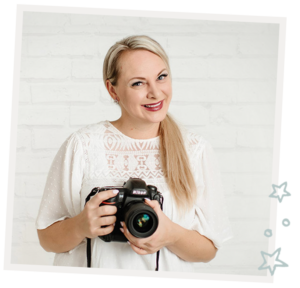
I'm
Lisa DiGeso
I’m on a mission to create uplifting online experiences for photographers ready to elevate their art, their business and their mindset.(...and have fun along the way!)

